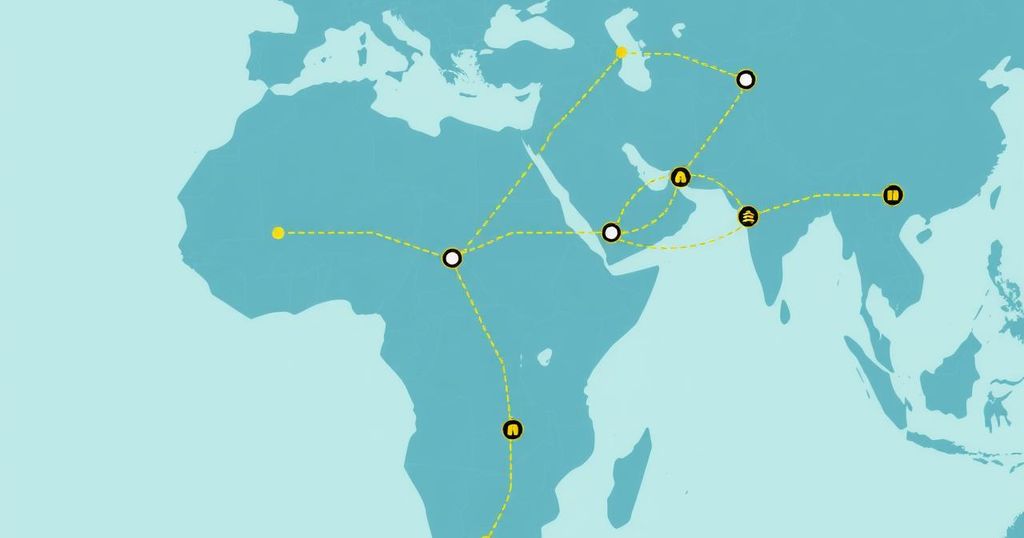This article discusses China’s recent ‘Two Sessions,’ which outline key economic targets and emphasize commitments to foreign investment, particularly towards Africa and Nigeria. The discussions highlight the evolving partnership between Nigeria and China, showcasing the strategic initiatives aimed at enhancing bilateral cooperation, including the establishment of the Nigeria-China Strategic Partnership.
The People’s Republic of China, being the second-largest economy globally, recently conducted its essential annual event in Beijing from March 4 to 6, featuring the “Two Sessions” of the 14th National People’s Congress (NPC) and the National Committee of the Chinese People’s Political Consultative Conference (CPPCC). Prominent figures in attendance included President Xi Jinping, who also serves as General Secretary of the Chinese Communist Party, Premier Li Qiang, and key Politburo officials.
During the Two Sessions, various critical topics were deliberated, including annual targets, GDP forecasts, national economic and social development plans, and budgeting. The main objectives for the year included a GDP growth target of 5%, an urban unemployment rate around 5.5%, the creation of over 12 million new urban jobs, a consumer price index increase of approximately 2%, and improvements in environmental conditions.
Premier Li Qiang discussed the external context’s influence on setting these targets, emphasizing the importance of job stability and people’s wellbeing. He noted, “In setting the growth rate at around 5%, we have taken into account the need to stabilise employment, prevent risks, and improve the people’s wellbeing.” Furthermore, he reassured that despite facing international changes, China remains committed to opening up and enhancing foreign investments through high-standard trade events.
Chinese Foreign Minister Wang Yi addressed the media regarding China’s diplomatic stance, highlighting the significant changes in the international landscape in 2024. He stressed the necessity for the Global South to unify and support each other, claiming, “The hallmark of our era is the prominent, growing strength of the Global South.” In a discussion about China-Africa relations, Yi urged for renewed support for Africa’s self-reliance and development strategies, marking the 25th anniversary of the Forum on China-Africa Cooperation.
He stated that China has contributed heavily to African development, notably through infrastructure projects, and has been Africa’s largest trading partner for 16 years. Yi remarked, “There will be no global modernisation without African modernisation,” emphasizing that Africa’s stability is crucial for global progress. Observers note that Nigeria, as a strategic partner of China, stands to benefit from the outcomes of these meetings, reflecting mutual growth aspirations.
Following the recent FOCAC summit, Nigeria’s partnership with China has evolved into a “Comprehensive Strategic Partnership,” enhancing trade and investment interactions. President Bola Ahmed Tinubu has reinforced this relationship by establishing the Nigeria-China Strategic Partnership (NCSP). This initiative is designed to oversee cooperation agreements and drive investment engagements.
The NCSP is reportedly engaging multiple stakeholders and promoting strategic links between Nigerian and Chinese government officials, facilitating investments across significant sectors including agriculture, energy, and infrastructure. Continuous successful cooperation has been evidenced by numerous infrastructure projects in Nigeria, such as the Lagos-Ibadan and Abuja-Kaduna railways and the Lekki deep seaport.
Lawal Sale is a Global South Affairs Analyst based in Abuja, reachable at lawalmaida1@yahoo.com.
In conclusion, the ‘Two Sessions’ in China have significant implications for Africa, particularly Nigeria, highlighting the potential for enhanced cooperative efforts. The focus on mutual economic growth, infrastructure development, and foreign investment by both nations signals a promising future in their diplomacy and partnership. Nigeria’s strategic initiatives, including the establishment of the NCSP, aim to solidify and expand the existing ties with China, ensuring comprehensive benefits for both countries.
Original Source: dknews.kz






